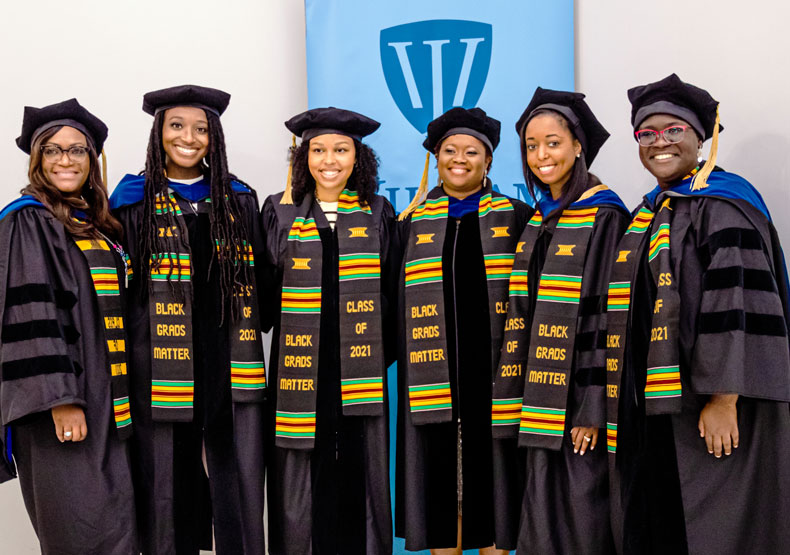Financial Aid
Financial Aid Office
Paying for Your Education
Each year, William James College awards just under $3 million to students. This can be disbursed as direct grants, scholarships, on-campus employment, and teaching assistantships.
The remainder of your tuition and fees can be financed through loans or savings. When
it comes to loans, we strongly encourage you to consider federal student loan programs,
and compare and understand all repayment conditions, before applying for a private
alternative loan. However, we do sponsor a variety of private or alternative loans
for our international students and for those who may want to expand their options.
If you are interested in looking at or applying for an alternative or private loan,
please go to www.elmselect.com.
As you look to continue your education and explore your financial aid options, William
James College is here to assist you with all aspects of the financial aid process,
including application processing, budget preparation, and management of educational
loans. For questions, or to schedule an appointment, please email financialaid@williamjames.edu.
Schedule an Appointment
Our financial aid team is available by appointment for one-on-one consultations as needed. Call 617-327-6777 x1524 or email us:
Email Financial AidFinancial Updates for Current Students
Below is a collection of tips and resources compiled by our Financial Aid Office to assist you with the financial aid process.
Instructions regarding Form 1098-T showing tuition billed for prior year will be e-mailed to your from the Bursar’s Office. Forms can be downloaded and copies can be requested after signing into the instructions. Please make sure that we have the correct address on file for you in Campus Nexus.
If you’re thinking about leaving school mid-semester, consider the following before you do. That decision could haunt you long after you drop out.
Returning Financial Aid
Leaving midterm when you have federal financial aid means that you may not be able to keep all of your aid award. If you leave before 60% of the semester is completed, your school is required to return a portion of your financial aid. This process is known as Return of Title IV (R2T4).
Your financial aid office determines how much is returned from each type of aid (Stafford loans, Pell grants, etc.), and the amount depends upon how long you attended and what type of aid you have. The biggest drawback to this is that once the aid is returned, you will likely have a balance at your school for the term that you aren’t completing.
Lingering Balances
Now that you have a balance for the term, you are responsible for paying that bill—even though you are no longer at school.
Unfortunately, ignoring the bills won’t make them go away. You should do your best to cover this balance before you officially withdraw or set up a payment plan with the school. Neglecting to do so will likely cause you to face a collections agency in the future.
Until the balance is paid in full, you will not be able to get an official copy of your transcripts from the school (if you wish to transfer somewhere else in the future).
Doing this is completely within the rights of a college. Though you do have the right to access your academic records under the Family Educational Rights and Privacy Act (FERPA), the school doesn’t have to give you official transcripts, which are usually required for college admissions. They can also refuse to send them to you via mail or email—instead requiring you to pick them up in person.
Future Aid Eligibility
Another consideration is that any federal aid that you receive will count toward your aggregate maximum eligibility (even though you did not complete the term) and your Satisfactory Academic Progress (SAP) if you return. Using more aid without completing credits extends how long you need to be enrolled in school and the amount of aid you’ll need to actually complete your program.
You could find yourself in a final term or year without enough federal aid to cover your balance, forcing you to borrow private loans or withdraw again—permanently.
Alternatives
I realize that the decision to go to college is a big one, both financially and personally, whether you are a traditional student straight out of high school or an adult going to college for the first time. Likewise, staying in school can also be a big decision, especially if life is getting in the way.
If you still need to withdraw after considering the consequences I’ve mentioned, make sure to have a plan for paying the balance on your account so that if you decide to return or transfer, you aren’t left with few options. Loans to pay off past-due balances are hard to come by.
When you do return to school, meet with an academic advisor to set up a plan to ensure that you will complete your education on time without reaching any SAP or aggregate aid limits to retain your federal aid eligibility.
Section 5.2: Policy Regarding Allowance for APA Interviews
For students who have scheduled APA internship interviews, WJC will, upon request, increase the student's COA (cost of attendance) to allow borrowing to cover reasonable transportation and hotel expenses incurred. William James will not cover expenses for food and other incidentals as these are covered in the regular COA budget.
- The student's APA interview schedule and estimated budget must be approved by the program director.
- The student must then submit the approved schedule to the financial aid office.
- Based upon "good faith" estimates, William James will advance a student the necessary funds to travel to the APA sites.
- Upon completion of the APA interview, student must submit transportation and hotel receipts to the financial aid office. Upon approval, the students COA will then be raised to accommodate these expenses allowing the ability to borrow additional funds.
Please note that William James will increase the COA to cover "reasonable" transportation and hotel costs. It is understood to mean that the student, if traveling by air or rail, will be reimbursed for the "coach" fare and a reasonable hotel would be considered a "moderate" hotel within the surrounding area and for the duration of the interview process only.
A student must be enrolled at least ½ time in order to be eligible to receive Federal Direct Loans for a period of enrollment. William James College defines ½ time as 4.5 contact hours which is typically 5 credits/semeseter (summer I and II can be combined).
If you will be enrolled for less than 4.5 contact hours for the summer and unable to "pay out of pocket," you may have a couple of options available:
- Arrange a payment plan with Nelnet. To enroll go to Nelnet Campus Commerce or call 800 722-4867
- Look into a private or alternative loan on www.elmselect.com
If you have any questions or concerns please contact bursar@williamjames.edu.






